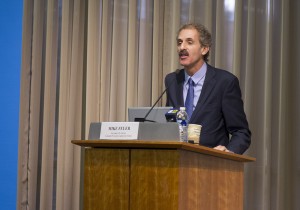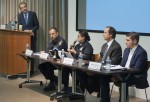UCLA and Los Angeles officials reviewed emergency responses to the June 1 murder-suicide and discussed potential improvements at a public panel Thursday.
Los Angeles City Attorney Mike Feuer moderated the panel at the Charles E. Young Research Library, which featured UCLA Police Chief Manny Garza, Administrative Vice Chancellor Michael Beck, West Los Angeles Police Captain Tina Nieto and Undergraduate Students Association Council President Danny Siegel.

Panelists discussed the June 1 murder-suicide, evaluated police response to the incident and described the university’s ongoing efforts to prevent gun violence.
In June, Chancellor Gene Block created a temporary Campus Safety Task Force to improve campus response to violence. The task force recommended making infrastructure improvements, increasing emergency training and improving campus communication in an October report.
The Campus Safety Task Force recommended changes to the BruinAlert system, which administrators used to update students during the campus lockdown following the murder-suicide.
Beck said there was a 90-minute interval between two BruinAlert messages during the lockdown, and some cellphone carriers directed the messages to spam folders, which the update fixed.
Beck added administrators updated the BruinAlert system to fix these issues before fall quarter started. Community members will receive texts at 10 to 15 minute intervals during future incidents, he said.
Administrators also modified classroom door locks to lock from the inside, Beck said. Previously, doors only locked during certain times and students were unable to lock doors during the lockdown.
[Related: USAC leaders work to increase gun control advocacy among students]
The panelists also discussed how to prevent gun violence on campus.
Beck said administrators help prevent and respond to gun violence by banning weapons on campus and encouraging community members to contact UCPD if they see someone with a weapon.
For example, one student notified UCPD when they saw someone with what appeared to be a concealed gun in a dorm and notified UCPD, Beck said. Officers reviewed camera footage and were able to meet with the individual, who was carrying an airsoft gun in the building.
Beck added he thinks mental health services can help prevent gun violence.
Garza said officers make assessments of potentially dangerous incidents, such as threatening social media posts, and decide whether to assign police or mental health counselors to intervene.
Panelists also reviewed California and Los Angeles gun control policies and agreed such policies were effective in preventing gun violence.
Feuer said UCPD can issue gun violence restraining orders, or prevent individuals from buying or owning weapons, if UCPD or the individuals’ families notice the individual intends to behave violently. He added that though Los Angeles and California have strong gun control laws, neighboring states may not, which can prevent local gun control efforts from being fully effective.
Siegel said he thinks the state’s decision to allocate $5 million for a gun research center at UC Davis will help sustain efforts to prevent campus violence in the future.
Nieto said she thinks the UCLA community must continue to discuss gun violence and push state and federal gun control legislation.
“We have to prepare and we can’t get complacent,” Nieto said. “We have to hold politicians accountable to legislation that makes our community safe.”
